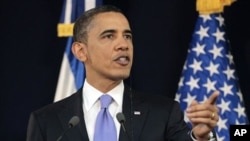President Obama says he remains confident that the U.S. will be able to transfer the coalition military operation in Libya to international control within a matter of days. The president spoke in El Salvador where he and his family are on the final stop of a three-nation Latin America tour.
The president 's visit to El Salvador, after previous stops in Chile and Brazil, is focused on strengthening bilateral ties and on issues such as regional counter-narcotics efforts.
But as at previous stops , he has been sharply focused on the progress of the military air campaign by the U.S., with the participation of European and Arab nations, to enforce UN Security Council resolutions to protect Libyan civilians from Libyan leader Moammar Gadhafi's forces.
Mr. Obama said has been on the phone with foreign leaders, including French President Nicolas Sarkozy and British Prime Minister David Cameron, and earlier Prime Minister Recep Tayyip Erdogan of Turkey.
The president responded to questions about a transition, which he and administration officials insist will take place in days rather than weeks, to international supervision.
"NATO is meeting today as we speak to work out some of the mechanisms for command and control," said President Obama. "I would expect that, over the next several days we will have clarity and a meeting of the minds of all those who are participating in the process. We are already seeing a significant reduction in the number of U.S. planes that are involved in operations over Libya."
At stops on this Latin America tour, reporters have pressed Mr. Obama and White House officials about what the U.S. and its partners would do in the event Colonel Gadhafi refuses to step down or leave Libya.
The president said Mr. Gadhafi would clearly continue to be a threat to his people unless he steps down or there are "significant reforms", adding that the U.S. will continue to support efforts to protect civilians while transitioning military operations to partners.
In addition to a "clear humanitarian interest" the president pointed to volatility in the larger North African and Middle East region to explain more broadly what else he sees as being at stake.
"We also have a very practical interest to make sure that the changes that are sweeping through that region are occurring in a peaceful, non-violent fashion, and when we can have some impact on that with a relatively modest contribution as part of a broader international effort, then I absolutely believe that the costs are outweighed by the benefits," said Obama.
The president said there are risks of upheaval and conflict in Libya spilling over into Egypt and Tunisia, where he said important peaceful political transitions are underway.
In addition to phone calls he made to key European leaders, the White House said the president also spoke with the Emir of Qatar, which joined the international coalition.
The White House also said Vice President Joe Biden spoke with Crown prince Mohammed bin Zayid al Nahyan of the United Arab Emirates, also part of the coalition enforcing the UN Security Council resolutions on Libya.
President Obama told reporters in San Salvador he is relieved that two U.S. pilots who ejected from their malfunctioning F-15 jet fighter jet over Libya are safe and in U.S. hands.
The president said that from the start, he sought to make sure, in discussions with military commanders, that the U.S. would be fully prepared to carry out recoveries of pilots, and repeated what he said in announcing the operation that there is no military operation that does not entail risk.
Obama Certain on Transition of Libya Operations
- By Dan Robinson

